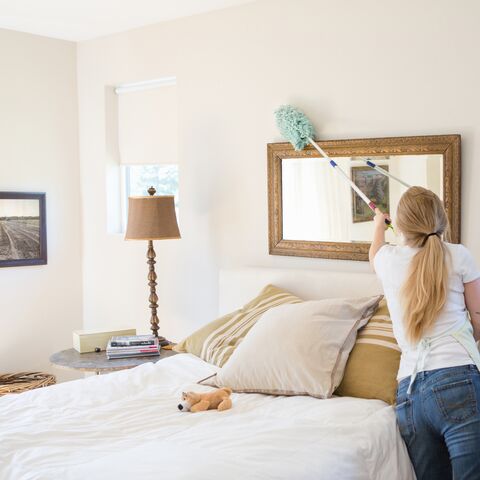
Employing domestic help privately: four steps to the correct employment
If you want to employ domestic help privately, you automatically become an employer – with benefits but also obligations. We show you, step by step, how to proceed and how to employ your cleaner correctly.
Whether you need regular cleaning or help with spring cleaning, there are many reasons for taking on domestic help. Your employment is accompanied by legal requirements that you must observe.
1. Find the right domestic help
As soon as you’ve decided to employ a cleaner privately, the search begins. In Switzerland, many cleaners offer their services via online platforms, often as part of a mini-job. When choosing new domestic help, you should pay particular attention to experience, reliability and trustworthiness. After all, you entrust your home to your domestic help – often even when you’re away.
And importantly, anyone who employs a cleaner privately takes responsibility – and that’s a good thing. With the right preparation and insurance coverage, you’ll create a fair basis for your domestic help. Not only do you avoid legal risks, but you also ensure security and transparency in your day-to-day life.
2. Clarify employment relationship and employ domestic help privately
As soon as you’ve found domestic help, the employment relationship must be clearly defined. Although a written employment contract is not mandatory, it creates transparency and protects both parties – especially in the event of disputes or accidents.
You should regulate the following points in the employment contract:
- Accident insurance
- Daily sickness benefits insurance
- Liability insurance
- Frequency and duration of working hours
- Place of work
- Hourly wage and deductions (incl. 13th monthly salary and vacation compensation)
- Notice period
- Any expense rules (e.g. for cleaning products brought along)
The Federal Council has set statutory minimum wages for domestic workers. These minimum wages apply unless your canton of residence has defined different rates in a normal employment contract. The following minimum wages apply until December 31, 2025:
- Unskilled: CHF 19.95 per hour
- Unskilled with four years’ experience: CHF 21.85 per hour
- Trained with Swiss Federal Certificate of Vocational Training (EBA): CHF 21.85 per hour
- Trained with Federal Certificate of Vocational Training (EFZ): CHF 24.05 per hour
The sample contracts (in German) issued by the State Secretariat for Economic Affairs (SECO) are annotated and also help you ensure that both sides are properly protected in the event of a dispute or accident.
Different regulations in standard cantonal employment contracts
Please note: in addition to minimum wages, standard cantonal employment contracts may also contain other binding rules, such as rest periods or obligations to continue salary payments. These provisions must also be complied with in the employment relationship.
The exact provisions vary from canton to canton. If you’d like to know what specific regulations apply in your canton, it’s worth taking a look at the website of the responsible cantonal office for economics and labor.
3. Register domestic help with OASI
As soon as you regularly hire a cleaner, you have to register them with OASI, even if they only work for a few hours. Domestic help must be registered with OASI. This also applies if the cleaner is already insured with OASI or a pension fund through another job.
You can simply register online in the Federal Compensation Office (EAK) portal (in German).
4. Take out accident insurance for domestic help
Accident insurance is prescribed by law as soon as you employ someone in your private household, even if they only work a few hours a week. It costs just CHF 100 a year and protects your privately employed domestic help against accidents at work and on the direct route to and from work.
If your cleaner works more than eight hours a week, they need more comprehensive insurance coverage for occupational and non-occupational accidents.
The following benefits are included in mandatory accident insurance:
- Treatment costs (medical treatment, hospital stays in the general ward)
- Daily benefits of up to 80 percent of insured earnings from day three
- Disability pension up to 80 percent of insured earnings
- Survivor's pension: 40 percent of insured earnings for widows/widowers, 15 percent for each orphan who has lost one parent, 25 percent for each orphan who has lost both parents (up to a combined maximum of 70 percent in the case of multiple survivors)
- Compensation for physical or mental impairment and helplessness allowance
- The insurance can be terminated at any time if you no longer employ domestic staff on a permanent basis.
Use settlement procedure
If your cleaner only earns a small wage, you can register them with the compensation office under the simplified procedure or the simplified Plus settlement procedure.





